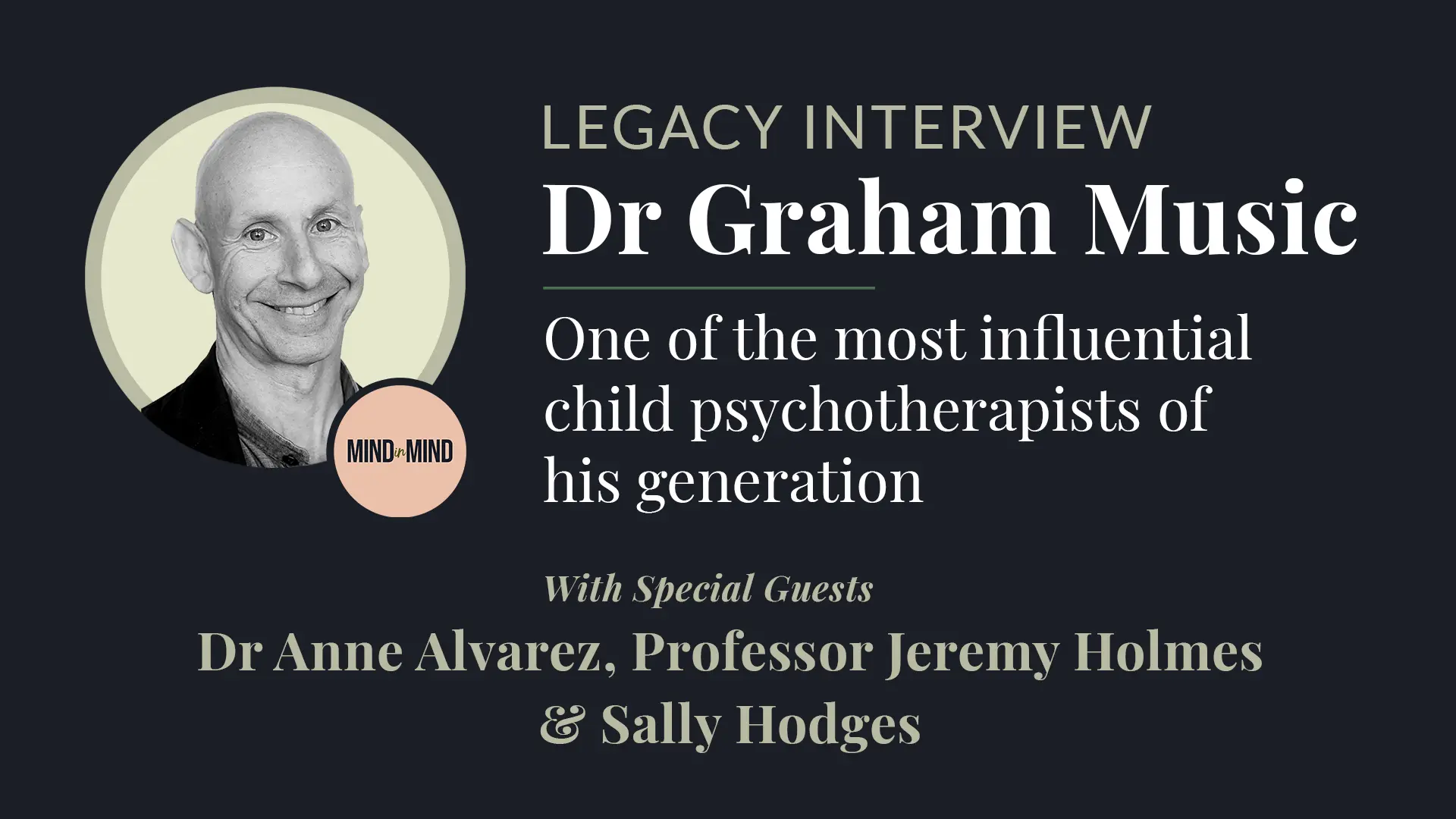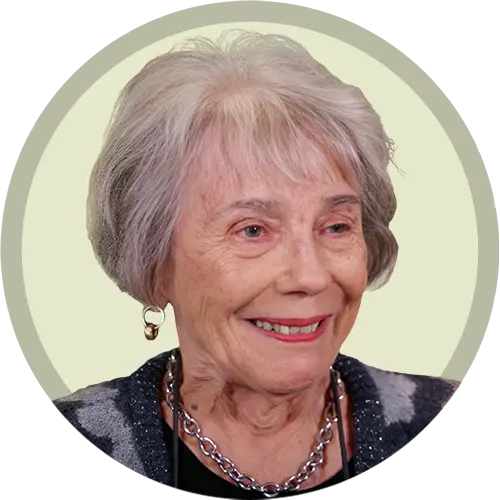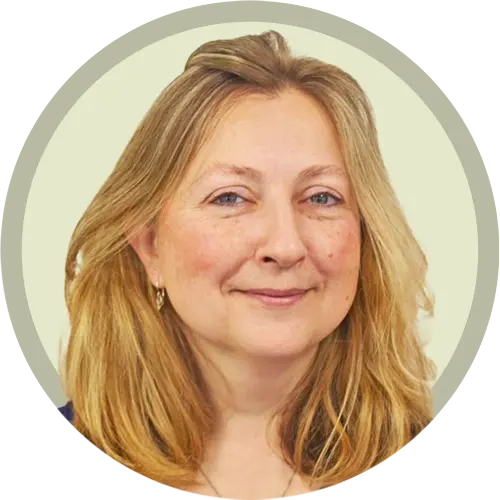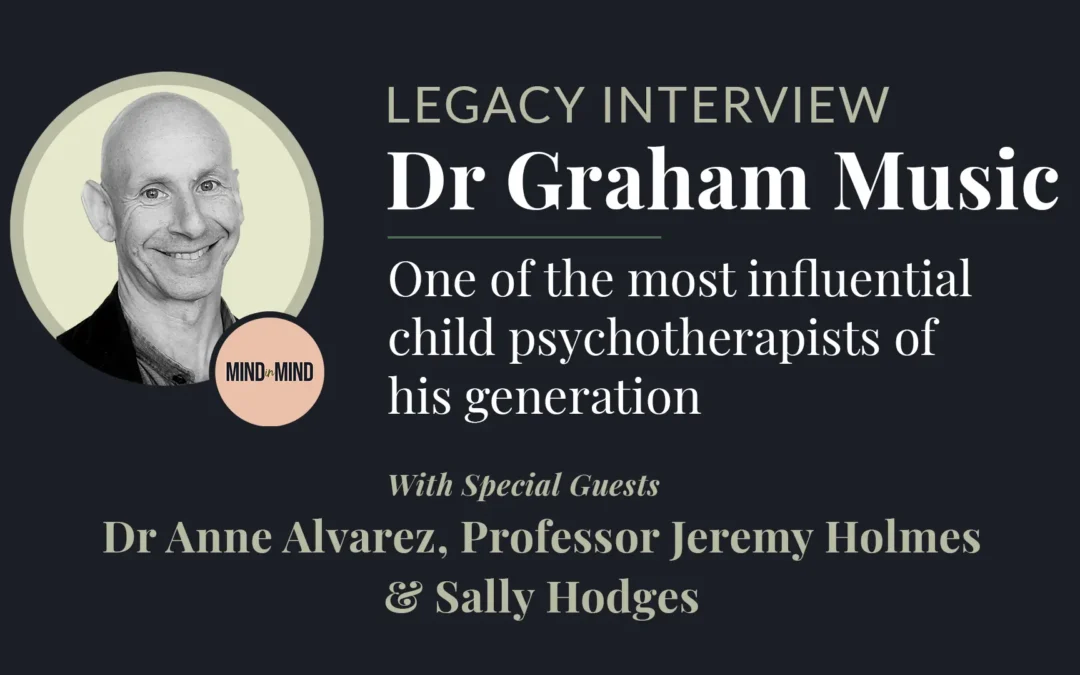
– Watch this recording for £36 includes a 2 hour CEU/CPD certificate –
Dr Graham Music Legacy Interview: Resparking Hope and Joy in Depressed and Traumatised Children
Exploring Graham Music’s pioneering work on psychoanalysis, neurobiology, attachment theory and innovations igniting hope in traumatised children.
Special Guests
Dr Anne Alvarez, Prof Jeremy Holmes & Sally Hodges
“Thank you so much for such a wonderful interview, I really appreciate Graham’s honesty and the insights he has brought from his experiences into his work.”
Dr Graham Music
 This MINDinMIND Legacy Interview is with Dr Graham Music, one of the most influential child psychotherapists of his generation. He is in conversation with three very special guests: Anne Alvarez and Jeremy Holmes who have helped shape his thinking about how best to help traumatised, depressed, and neglected children and by Sally Hodges, one of the most senior figures at the Tavistock and Portman Clinic.
This MINDinMIND Legacy Interview is with Dr Graham Music, one of the most influential child psychotherapists of his generation. He is in conversation with three very special guests: Anne Alvarez and Jeremy Holmes who have helped shape his thinking about how best to help traumatised, depressed, and neglected children and by Sally Hodges, one of the most senior figures at the Tavistock and Portman Clinic.
We hear how Graham Music has evolved an innovative way of working with traumatised children, drawing on psychoanalysis, neurobiology, and attachment theory.
Graham’s dedication to integrating cutting-edge developmental findings with practical therapeutic practices underscores his commitment to making a real difference in the lives of traumatised children.
Key points from the interview include
- Integrating ideas from diverse disciplines into a coherent treatment
- How can we help children and young people who are flat, numb, depressed
- New ideas about ‘dampening down’ and ‘numbing’ after traumatic events
- He explains what happens in the body in the face of threat
Attuning therapeutic work to individual children - New concepts such as ‘nervous system whispering’ to create a secure environment for emotional healing and how ‘cell-danger response’ induces shut-down
- How most therapeutic work needs to start with a ‘safening’ reset, and then a reboot
- Why real therapeutic change requires courage as well as safeness
- The need for deep attunement to each child’s unique needs, ensuring effective and compassionate interventions
- Creating therapeutic environments that promote healing by integrating psychoanalysis, attachment theory, and neurobiology
- Resilience and the conditions necessary for it to flourish post-trauma
- Implications for community-based mental health services, stressing the importance of accessibility for disenfranchised communities
Special Guests
Dr Anne Alvarez
 Dr Anne Alvarez’s teaching and seminal publications have transformed therapeutic for clinicians across the world, creatively integrating developmental understandings with classical analytic. She is a Consultant Child and Adolescent Psychotherapist and former Co-Convener of the Autism Service at the Tavistock Clinic. She is an early supervisor of Graham’s work and continues to be an important influence on his thinking.
Dr Anne Alvarez’s teaching and seminal publications have transformed therapeutic for clinicians across the world, creatively integrating developmental understandings with classical analytic. She is a Consultant Child and Adolescent Psychotherapist and former Co-Convener of the Autism Service at the Tavistock Clinic. She is an early supervisor of Graham’s work and continues to be an important influence on his thinking.
In this interview Anne discusses:
- The transformative power of developmental understanding in therapeutic practice
- The importance of integrating developmental perspectives with classical psychoanalytic techniques
- Her work with children on the autism spectrum, highlighting the necessity of nuanced approaches to meet the individual needs of these children
- Anne also shared her insights on supervision
- The evolution of therapeutic methods
Professor Jeremy Holmes
 Professor Jeremy Holmes is a world leader in integrating attachment theory and psychoanalytic thinking, and more recently, cutting-edge brain science such as the theories of Karl Friston. He is Consultant Psychiatrist/Medical Psychotherapist at University College London and Chair of the Psychotherapy Faculty of the Royal College of Psychiatrists. He describes having a lifetime’s devotion to psychoanalytic psychotherapy and Attachment Theory and is an inspiration in Graham’s own work.
Professor Jeremy Holmes is a world leader in integrating attachment theory and psychoanalytic thinking, and more recently, cutting-edge brain science such as the theories of Karl Friston. He is Consultant Psychiatrist/Medical Psychotherapist at University College London and Chair of the Psychotherapy Faculty of the Royal College of Psychiatrists. He describes having a lifetime’s devotion to psychoanalytic psychotherapy and Attachment Theory and is an inspiration in Graham’s own work.
In this interview Jeremy discusses:
- The integration of attachment theory with psychoanalytic thinking, blending these frameworks
- Contemporary brain science, particularly the theories of Karl Friston
- The significance of secure attachment in the therapeutic process
- How understanding the brain’s response to trauma can enhance therapeutic outcomes
- His long-standing commitment to psychoanalytic psychotherapy and its application in modern clinical practice, offering practical examples from his extensive career
Sally Hodges
 Sally Hodges is Clinical Chief Operating Officer at the Tavistock and Portman NHS Trust. Formerly Director of Children, Young Adults, and Families at the Tavistock, Sally is a Consultant Clinical Psychologist specialising in children with learning and developmental disabilities.
Sally Hodges is Clinical Chief Operating Officer at the Tavistock and Portman NHS Trust. Formerly Director of Children, Young Adults, and Families at the Tavistock, Sally is a Consultant Clinical Psychologist specialising in children with learning and developmental disabilities.
In this interview Sally discusses:
- Her experiences as a Clinical Psychologist and the operational challenges of managing services for children with learning and developmental disabilities.
- The importance of accessibility and inclusivity in mental health services, emphasising the need for community-based approaches.
- The practical implementation of therapeutic models in diverse settings, highlighting the innovative programmes developed at the Tavistock and Portman NHS Trust, and her collaboration with Graham Music in advancing these initiatives.
More about Graham
Dr Graham Music is a Consultant Child and Adolescent Psychotherapist at the Tavistock Centre where he has worked for over 20 years. He has also been an adult Psychotherapist for over 30 years. Formerly Associate Clinical Director of the Tavistock Clinic’s Child and Family Department, he developed many innovative programs, including setting up therapy teams in over 40 schools. He also developed and managed a range of services working with the aftermath of child maltreatment and neglect, and initiated many community-based psychotherapy services designed to ensure access to disenfranchised communities. He currently works at the Portman Clinic as a forensic psychotherapist, and his clinical specialty for decades has been working with trauma.
At the Tavistock, he developed a brand new model of working therapeutically with children (M34) as well as introducing Mindfulness, Compassion Focussed Therapy, Intensive Short Term Dynamic Psychotherapy FT, and a range of other trainings into the Trust. He supervises and teaches nationally and internationally and has a particular interest in linking cutting-edge developmental findings with therapeutic practice. He is a Board Member of MINDinMIND.
Interviewer
Graham is in conversation with Jane O’Rourke.
Jane is a Child, Adolescent and Family Psychotherapist and Founder of MINDinMIND. She was formerly a senior producer at the BBC and recently won the Association of Infant Mental Health’s Founders Prize. She runs the counselling service in a state primary school in London, United Kingdom.
This recording was made 15 March 2022
Resources & Readings
You can sign up for Graham Music’s newsletter at https://nurturingnatures.co.uk/sign-up/ or visit his website https://nurturingnatures.co.uk/, and he can be contacted by email gmusic@nurturingnatures.co.uk or twitter, or Linkedin.
Books:
Music, G (2022) Respark: Igniting Hope and Joy after Trauma and Depression. London: Mind-Nurturing Books
Nathanson, A., Music, G. and Sternberg, J. (2021) From Trauma to Harming Others: Therapeutic Work with Delinquent, Violent and Sexually Harmful Children and Young People. Routledge.
Music, G. (2019) Nurturing Children: From Trauma to Growth Using Attachment Theory, Psychoanalysis and Neurobiology. Abingdon, Oxon ; New York, NY: Routledge.
Music, G. (2016, 2010) Nurturing Natures: Attachment and Children’s Emotional, Social and Brain Development. London: Psychology Press.
Music, G. (2014) The Good Life: Wellbeing and the new Science of Altruism, Selfishness and Immorality. London: Routledge.
View more publication on Graham’s website https://nurturingnatures.co.uk/


